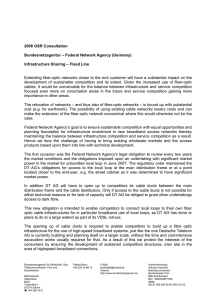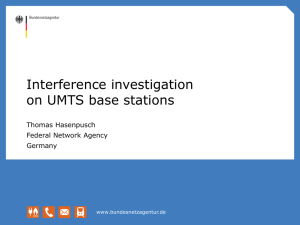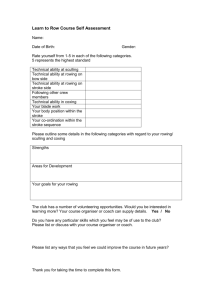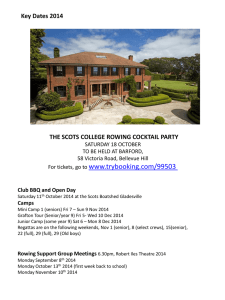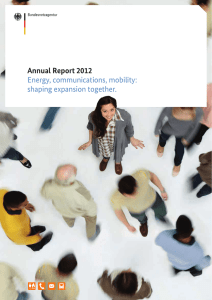Monitoring during major events – Case studies Kyiv, 10-12 July 2013
advertisement
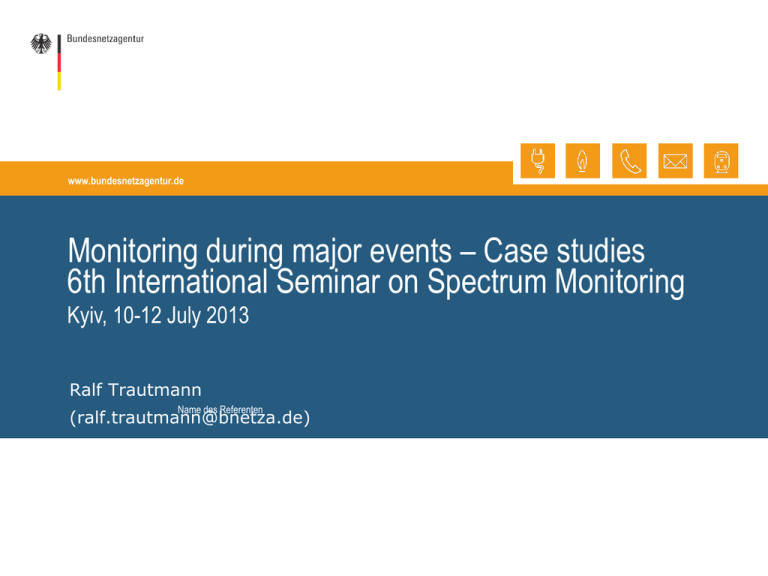
www.bundesnetzagentur.de Monitoring during major events – Case studies 6th International Seminar on Spectrum Monitoring Kyiv, 10-12 July 2013 Ralf Trautmann Name des Referenten (ralf.trautmann@bnetza.de) Introduction What types of special/major events are there? What is different compared to usual business? What has to be done before the event? Which resources are required? What has to de done during the event? What problems can we expect? Monitoring during major events – Case studies © Bundesnetzagentur 2 Introduction Types of events Small events, no need of any attendance Events requiring merely spectrum monitoring Events requiring frequency management and monitoring Big events requiring enormous preparations Monitoring during major events – Case studies © Bundesnetzagentur 3 Introduction What is different compared to usual business? Generally: same tasks as usual, but often incomplete information available short response time no possibility to ask the office, decisions have to be made on site requiring quick decisions at a lower level Monitoring during major events – Case studies © Bundesnetzagentur 4 Case studies Case studies will provide some experiences! G8 summit 2007 World rowing championship 2007 Formula 1 race Nürburgring 2007 Monitoring during major events – Case studies © Bundesnetzagentur 5 G8 summit The G8 summit, attended by 33 heads of governments, took place in Heiligendamm, Germany, 6 – 8 June 2007. In a meeting with other authorities two months before the summit the technical possibilities were discussed and the responsibilities were defined. Monitoring during major events – Case studies © Bundesnetzagentur 6 G8 summit A fixed direction finder mounted on a 40 m mast and 5 mobile direction finders of different polices and of the Bundesnetzagentur (Federal Network Agency) were launched. Training: A mobile, non-permanent pulsed test emission had to be localised a week before the summit by all mobile direction finding teams. Hundreds of mobile and hand-held radios were in use during the summit by the safety and emergency forces. Monitoring during major events – Case studies © Bundesnetzagentur 7 G8 summit An FM broadcast pirate transmitter was operated in an opponents’ camp. The emissions ceased firstly after a phone call. In the evening, however, they continued to transmit again. For safety reasons the police decided not to confiscate the transmitter. The opponents used PMR to communicate. On June 2nd there was a major demonstration of G8 opponents in the old harbour of Rostock. The city center of Rostock was cordoned off. 1000 people were injured. Monitoring during major events – Case studies © Bundesnetzagentur 8 G8 summit Most interference of the some 70 interference problems could be solved by the users, e.g. police. The radio monitoring staff could temporarily not access their hotel because it was blocked by opponents and media people. Monitoring during major events – Case studies © Bundesnetzagentur 9 G8 summit Monitoring during major events – Case studies © Bundesnetzagentur 10 World Rowing Championship Monitoring during major events – Case studies © Bundesnetzagentur 11 World Rowing Championship Monitoring during major events – Case studies © Bundesnetzagentur 12 World Rowing Championship Agenda Saturday Test starts, rowing training (since Friday) Presentation of music and costumes Salutation by athletes Parade of teams, speeches and anthems Dance shows, fashion show Fireworks (no need for spectrum monitoring) Monitoring during major events – Case studies © Bundesnetzagentur 13 World Rowing Championship Agenda Sunday- Wednesday Lower level rowing contests Relative low interest of mass media The host broadcaster and the radio monitoring service started their on-site activities on Monday Thursday, Friday Finales and semi finales Monitoring during major events – Case studies © Bundesnetzagentur 14 World Rowing Championship Agenda Saturday Finales Sunday Finales Final ceremony Monitoring during major events – Case studies © Bundesnetzagentur 15 World Rowing Championship Figures 300 accredited sports reporters were expected A restaurant and a hall were used as the media centre hosting 50 % of the workplaces. The other 50 % were established on the tribune with a view to the finishing line and to a 70 m2 video screen. The workplaces were equipped with ISDN and analogue telephone connections, 3 Gbit/s DSL broadband Internet connections and RLAN. Monitoring during major events – Case studies © Bundesnetzagentur 16 World Rowing Championship 2007 Figures 51.000 spectators visited the rowing championship 2007 (62.000 including the free of charge opening ceremony) 15.000 visitors came on the last day; 10.000 on the tribune and 5.000 in the meadows 26 pieces of radio equipment of 19 networks were inspected Monitoring during major events – Case studies © Bundesnetzagentur 17 World Rowing Championship 2007 Monitoring results • Spectrum supervision revealed several unlicensed emissions. • Search of these emissions using EB 100 and EB 200 handheld equipment from R&S • One company had used frequencies without license already at earlier events; they received a fine. • Some teams had not at all applied for a radio license. Monitoring during major events – Case studies © Bundesnetzagentur 18 World Rowing Championship 2007 Monitoring results • A voice link from the tower to the mixer used intentionally a frequency in the middle of 2 assigned microphone channels; they will receive a fine. • The organiser used partly radio amateur frequencies. • The host broadcaster is the frequency manager for foreign broadcasters. He was not present all the time. As a consequence, the organiser made frequency agreements with TV service providers. Monitoring during major events – Case studies © Bundesnetzagentur 19 World Rowing Championship 2007 Monitoring during major events – Case studies © Bundesnetzagentur 20 Formula 1 race Nürburgring 2007 Arrival and accreditation on Wednesday • Meeting of 6 technicians with the person in charge for short-term licensing • The same area as last year next to the TV compound was assigned to park 1 GHz van, 1 direction finder vehicle and 2 standard measurement vehicles Access authorisation • No problems, 7 photo badges were issued granting access to paddock and TV compound and 3 tabards for the course Monitoring during major events – Case studies © Bundesnetzagentur 21 Formula 1 race Nürburgring 2007 Communication • ISDN connection for telephone, fax,and Internet • GSM terminals Short-term frequency assignments • Due to the large number of interference there was a need for short-term licenses again and again • Thorough arrangements with the police allowed to find numerous solutions for wireless cameras at 2.3 - 2.4 GHz Monitoring during major events – Case studies © Bundesnetzagentur 22 Bibliography Report ITU-R SM.2257 provides a lot of information regarding the preparation and enforcement of major events. Annexes contain interesting examples from China, Brazil, Korea, Germany and UAE Monitoring during major events – Case studies © Bundesnetzagentur 23 Questions Monitoring during major events – Case studies © Bundesnetzagentur 24
